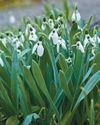
If you’re confused about what to plant now, you’re not alone. Rapidly shifting climate conditions, from drought to floods and fires to ice storms, have many of us rethinking our approach to gardening. I asked industry experts across the country to share their perspectives, and several themes emerged about stewarding beautiful, resilient landscapes in the years ahead. Wherever you live, you’ll find strategies to apply in your garden.
Be Your Garden’s Detective
“Gardeners need to keep learning and being curious. If a plant is struggling, start acting like a detective,” said Brooke Edmunds, Oregon State University extension agent and Master Gardener lead in the state’s Marion and Polk counties.
“Gardeners attuned to their conditions will continue asking foundational questions,” she said. “Is it something with the soil? Is it not in quite the right spot? Is it getting enough sunlight? We all have to adapt.”
As we try to lessen our impact on the planet and garden with fewer inputs and greater purpose, finding the right plant for the right place has never been trickier or more important.
Location, Location: Microclimates Rule
The sun, wind, drainage and soil can change within a few feet in your garden. Observing microclimates—like where your spring bulbs bloom first, which spots hold water and which get scorched in the afternoon sun—is key to success. Elevated sites, including raised beds and the tops of berms, tend to be warmer and windier and can dry out quicker. Beds against sunny walls can offer some cold protection, while gardens at the base of a hill may sit in a frost pocket.
This story is from the July - August 2024 edition of Horticulture.
Start your 7-day Magzter GOLD free trial to access thousands of curated premium stories, and 9,000+ magazines and newspapers.
Already a subscriber ? Sign In
This story is from the July - August 2024 edition of Horticulture.
Start your 7-day Magzter GOLD free trial to access thousands of curated premium stories, and 9,000+ magazines and newspapers.
Already a subscriber? Sign In

Pot It Up
Shake up the containergarden with theseNorth America –native perennials

THE GARDEN PATH TO PERDITION
I WAS CRUISING RIGHT ALONG, feeling okay about myself, when I came across a list of the Seven Deadly Sins.

A Productive PATIO
Tiny fruit, vegetable and herb plants help gardeners maximize any sort of growing space

TROPICAL FUSION
A FUSS-FREE APPROACH TO USING BOLD TROPICAL PLANTS IN ANY TEMPERATE GARDEN

WINTER READING
Pass the time with any of these inspiring books

SENSING A PATTERN
Greg Coppa reflects on an odd weather year and what continued warming may mean for his Rhode Island garden

TOP-PRIZE PERENNIALS
A foliage masterpiece for shade and a late bloomer for sun

MARK WESSEL
What's new for fruit and vegetable gardeners?

KINGS OF THE NORTHERN FORESTS
A look at the trees, shrubs and perennial plants that bolster life in Ecoregion 5

PROJECT FEEDERWATCH
Gardeners can help scientists know just where the birds are in winter